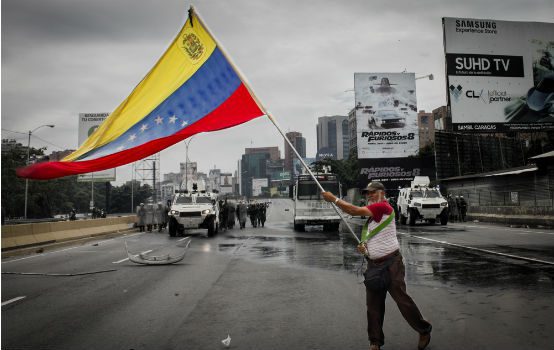The Pitfalls of Weaponizing Aid Deliveries

International aid organizations refuse to participate in weaponizing aid deliveries as part of our government’s regime change policy in Venezuela:
The U.S. effort to distribute tons of food and medicine to needy Venezuelans is more than just a humanitarian mission. The operation is also designed to foment regime change in Venezuela — which is why much of the international aid community wants nothing to do with it.
Humanitarian operations are supposed to be neutral. That’s why the International Committee of the Red Cross, United Nations agencies and other relief organizations have refused to collaborate with the U.S. and its allies in the Venezuelan opposition who are trying to force President Nicolás Maduro from power.
“Humanitarian action needs to be independent of political, military or any other objectives,” Stéphane Dujarric, the U.N. spokesman, told a press briefing last week in New York. “The needs of the people should lead in terms of when and how humanitarian assistance is used.”
The dispute over aid deliveries to Venezuela is a good example of how taking sides in another country’s political crisis can undermine effective humanitarian assistance. Because the U.S. government has declared for the opposition leader against the current government, any aid that the U.S. provides will be and will be perceived as part of the effort to overthrow Maduro. As a result, Maduro has a strong incentive to block that aid, and that is exactly what he has been doing. Once outside governments weaponize the delivery of humanitarian aid, that makes it much harder to combat hunger and preventable diseases in the affected country. Aid deliveries should not be abused for P.R. purposes or to score political points against rivals.
Taken together with the imposition of sanctions on Venezuela’s oil sector, the attempt to use aid as a political weapon to achieve regime change is particularly cruel. Not only are U.S. sanctions strangling the Venezuelan people, but what little relief our government is willing to offer can’t get into the country. At the same time, it puts additional pressure on local aid workers:
But the risks of linking humanitarian assistance to regime change are already coming into focus, with some Venezuelan aid workers being denounced by the Maduro government as opposition activists, says Daniel Almeida of CARE International, which partners with aid groups in Venezuela.
“Local NGOs have received some … warnings because of their engagement with international aid. The whole environment is becoming more aggressive,” Almeida said.
Another danger, experts say, is that Maduro — who currently allows in some humanitarian assistance from various international agencies — could close the door on aid altogether.
The destructive effects of the sanctions will not only worsen conditions for the people, but they will also make it more difficult for aid groups already in the country to operate and deliver goods to those in need:
Meanwhile, aid groups are bracing for a new round of U.S. sanctions that effectively block the sale of Venezuelan oil to the U.S. These proceeds make up the bulk of Venezuela’s cash income, which is used to import food and medical supplies.
That means rice, milk, antibiotics and other vital products could become even more scarce, says Phil Gunson, who is based in Caracas for the International Crisis Group. He says the situation could soon resemble a “medieval siege where you prevent your adversary from obtaining resources from outside the city walls.” [bold mine-DL]
What’s more, the sanctions could worsen the current shortages of gasoline and auto parts.
“If we can’t move around due to a lack of gasoline, that means humanitarian aid cannot be mobilized,” warns Feliciano Reyna, the founder of Acción Solidaria, a health and human rights group that distributes medicine to 14,000 Venezuelans.
When our government’s sanctions threaten to increase starvation and deprivation in a country already enduring a profound humanitarian crisis, providing aid shipments won’t be adequate to make up for the shortages created by sanctions. One cannot make up for strangling the civilian population with the effects of sanctions by sending some aid shipments, and when those shipments are being sent to advance a particular agenda they won’t be able to help very many people at all.
Comments